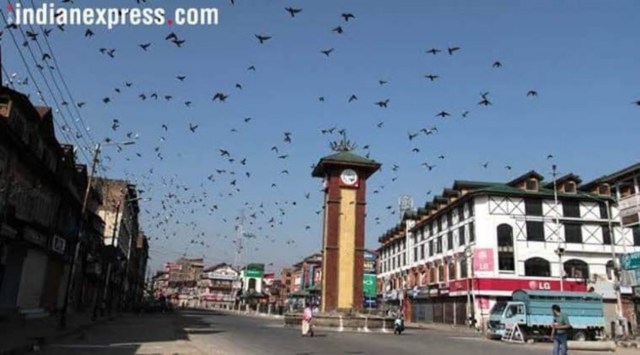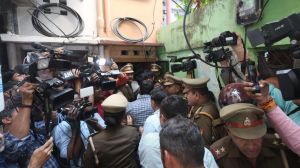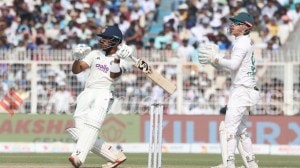Petitioners who have challenged changes made to Article 370 on Wednesday told the Supreme Court that the 1947 Instrument of Accession (IoA), by which Jammu and Kashmir was ceded to the dominion of India, did not surrender all sovereignty to India.
On August 10, Chief Justice of India D Y Chandrachud, presiding over a five-judge Constitution Bench hearing the matter, had said that the IoA completely transferred the sovereignty to India.

On Wednesday, senior advocate Rajeev Dhavan, appearing for J&K People’s Conference, told the bench, also comprising Justices S K Kaul, Sanjeev Khanna, B R Gavai and Surya Kant: “There seems to have been some misunderstanding on the status of merger agreements. The question which fell from your Lords was that once the IoA is over, sovereignty is complete. IoA deals with external sovereignty. External sovereignty is lost with a few exceptions here and there, but internal sovereignty is not lost.”
Story continues below this ad
He also referred to the standstill agreement, formulated to ensure that all administrative arrangements that existed between the British crown and the princely state would continue unaltered between the signatory dominions (India and Pakistan) and the state, until new arrangements were made.
Dhavan said, “…the purpose of the standstill agreement was what system you will have in the meanwhile. Maharaja [Hari Singh, erstwhile king] didn’t sign the standstill…which means he retained all his power.”
A merger agreement is what indicates the extent of external sovereignty, and since there was no merger agreement between J&K and India, and no standstill agreement either, “the Maharaja would be absolute…. So I take 370 to be a Constitutional substitute for a standstill and merger agreement, without which we are lost”.
Dhavan also said that as per the proviso to Article 3 dealing with “formation of new States and alteration of areas, boundaries or names of existing States”, it is mandatory for the President to refer the Bill for reorganisation of a state to the legislature. “It is a condition precedent before you invoke Article 3,” he submitted.
Story continues below this ad
He contended that the move to impose President’s Rule under Article 356 in the then state of J&K on December 19, 2018, virtually created an amendment of Article 3 by suspending the proviso that requires the President to refer the matter to the state legislature. Dhvan said this was not something that could be done under Article 356 and that “it is a Constitutional amendment which is subversive of the Constitution itself”.
The CJI pointed out that Article 356(1)(c) says the President has the power to suspend some provisions during operation of a proclamation under Article 356.
Dhavan argued, “If you expand 356(1)(c), you will say that the President has a carte blanche to amend any part of the Constitution as per the supplementary provisions…356(1)(c) has to be read with mandatory provision which it cannot dilute”.
The CJI wondered whether accepting the argument would amount to reading into Article 256, words which are not there.
Story continues below this ad
“The proviso seems to indicate that if the Constitution wanted to exclude a particular power from the authority to suspend a provision of the Constitution, then that has been specifically defined,” CJI Chandrachud said. “The proviso says that you will not suspend anything pertaining to a High Court, or you’ll not assume to yourself as President any of the powers of High Court during the operation of 356. So where it wanted restraint on the Presidential power, it did so in the firm of the proviso.
“Could we now say now that apart from the proviso, there may be certain other parts of the Constitution which the President cannot suspend, or would that be reading into Article 356 words are not there?”
Dhavan said it must relate to whatever is required to materialise Article 356 and it has to be given a limited meaning. He said the December 19 proclamation is an abuse of the Constitution. “When Maharashtra was broken, they said you have to refer whether you like it or not; likewise Punjab,” he said. “You have to refer it to the legislature. You can’t self-refer it to Parliament”, Dhavan added.
Senior advocate Dushyant Dave, also appearing for the petitioners, said Article 370 is perhaps the most brilliant articulation of statesmanship on part of the framers of the Constitution. “You are at a time when calls for plebiscite are being raised in Kashmir. You are at a time when raiders are raiding in plain clothes…. You are at a time when Maharaja is uncertain whether he wants to join India or Pakistan. At a time like that, this was a brilliant compromise that was arrived at, which led to producing the Article which persuaded people of J&K to accede to India,” he submitted.
Story continues below this ad
Dave contended that the exercise of powers by the President on August 5 and 6 are “nothing but fraud on the Constitution. The only material was that the ruling party manifesto in 2019 had said that we’ll abrogate 370”.
The senior counsel submitted that while the government had said that it was done in national interest, no one knows what this national interest is because it has not been defined in the government’s counter-affidavit. He said there is insurgency even in north-eastern states and argued that if one were to start disintegrating states into Union Territories because of that, no state would be saved.
“It has ramifications on the future of India…to be giving this kind of power to a majoritarian government would be destruction of rule of law,” Dave said.
The arguments will continue Thursday.









